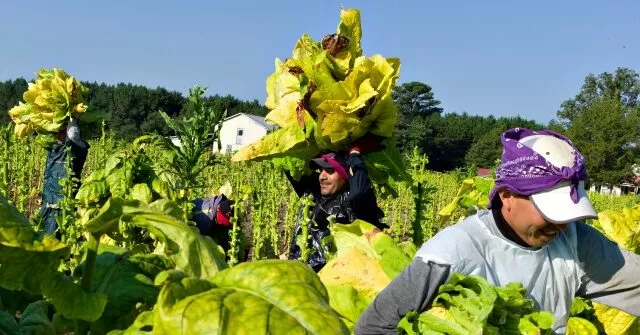Agriculture Secretary Brooke Rollins has come under fire recently for her proposal to exempt farmers, meatpackers, and restaurant employers from certain immigration laws. However, she remains steadfast in her defense of this controversial measure, stating that it is necessary to support the industries that play a vital role in feeding America.
Rollins has received significant criticism for her proposal, with some arguing that it is a blatant disregard for the rule of law and a way to exploit vulnerable undocumented workers. However, she maintains that this exemption is not about undermining immigration laws but rather about preserving essential industries that have been hit hard by the ongoing pandemic and labor shortage.
The reality is that the agriculture, meatpacking, and restaurant industries heavily rely on immigrant labor. These hardworking individuals play a critical role in ensuring that Americans have access to fresh, affordable produce, and food products on their tables. Without their contributions, these industries would struggle to survive, and the American people would suffer from a shortage of essential goods.
Rollins argues that the exemption is also crucial for the survival of small businesses within these industries. With labor shortages and rising costs, many farms, restaurants, and small meatpacking plants are struggling to make ends meet. By exempting them from certain immigration laws, Rollins hopes to provide a much-needed lifeline to these businesses, allowing them to continue operating and supporting their local communities.
Moreover, Rollins emphasizes the need for a comprehensive, long-term solution to America’s immigration system. The current system is broken and outdated, and it is not equipped to handle the demands of our modern economy and society. As such, Rollins believes that temporary exemptions, like the one she is proposing, are necessary while the government works towards a more sustainable and efficient immigration system.
Some critics argue that this exemption would only benefit big corporations and exploit vulnerable workers. However, Rollins assures that this is not the case. The exemption would be available to all businesses within the specified industries, regardless of their size or financial standing. This is about supporting the industry as a whole and ensuring that American consumers continue to have access to the goods and services they need.
Furthermore, Rollins points to the numerous safety measures in place to protect immigrant workers, such as minimum wage laws, workplace safety regulations, and anti-discrimination laws. Any violations of these laws would result in severe consequences for the employers, providing workers with much-needed protection and security.
In her defense of this exemption, Rollins also stresses the importance of maintaining a strong relationship with our neighboring countries, particularly Mexico. With the ongoing border crisis and strained international relations, it is crucial to find ways to work together and support one another. The proposed exemption would also help to reduce the illegal immigration that often results from a lack of legal opportunities for workers to enter the country.
In conclusion, Agriculture Secretary Brooke Rollins’ proposal to exempt farmers, meatpackers, and restaurant employers from certain immigration laws is necessary for the survival of these essential industries. It is not a disregard for the rule of law or an attempt to exploit vulnerable workers, but rather a temporary solution to support businesses and ensure the availability of essential goods. As we work towards a long-term solution for America’s immigration system, it is imperative to support our industries, protect our workers, and maintain positive relationships with our neighbors.





![Complete BritRail Pass Guide [Types, How to Use It, Pros + Cons]](https://inside-news.uk/wp-content/uploads/2025/06/00221EB4-BCA2-4DBB-6CD4-83DBC37D71FA-120x86.webp)
















